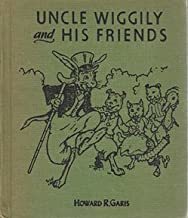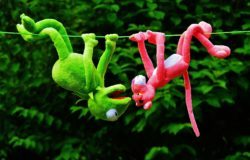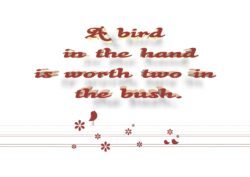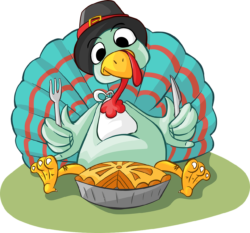Arlene Miller's Blog, page 31
January 31, 2020
My Life in Books, Part 1
 What is the first book you remember reading? Or having read to you? Or owning?
What is the first book you remember reading? Or having read to you? Or owning?
Last week I asked my readers and social media friends to submit their favorite books to me. I did get some responses (thank you), but I don’t have enough yet. I will be making those responses into a post in a couple of weeks, so please submit your favorite books or genres to me at bigwords101@yahoo.com.
Here is a question: Can you tell a person’s age by the books they remember reading? 
January 22, 2020
A Blast from the Past: “Compose” Versus “Comprise”
 Image by Gordon Johnson from Pixabay
Image by Gordon Johnson from PixabayThis post was originally published here in 2017. But it still is a tricky issue . . .
—————————————————————————————-
“Hmmm….Should I use compose or comprise? What is the difference?”
Yes, these two words are confusing indeed. They mean the same thing, but are used differently. Much of the time it is easier to just give up and use a substitute word or phrase.
Comprise means “is made up of.” So the whole comprises the parts. In other words, when using comprise, the whole will come before the parts:
The United State comprises fifty states. (The United States is made up of fifty states.)
The class comprises second, third, and fourth grade students.
The family in the photo comprises seven members.
Compose means “to make up.” The parts compose the whole. So here, the parts will come before the whole:
Fifty states compose the United States.
Second, third, and fourth graders compose the music class.
Seven people compose the family seen in the above portrait.
Now, we can try to”flip” the words around into a sort of a passive-sounding usage is composed of, which can be used in place of comprise. Here, the whole is composed of the parts:
The United States is composed of fifty states. (comprises fifty states)
The music class is composed of second, third, and fourth graders. (comprises second, third, and fourth graders)
The family is composed of mother, father, and five children. (comprises a mother, a father, and five children)
Don’t worry about flipping comprise around because you can’t. “Is comprised of” is not a thing, so don’t bother with it. Here are the three correct ways to say it:
The department comprises a manager, an assistant manager, and four salespeople.
The department is composed of a manager, an assistant manager, and four salespeople.
A manager, an assistant manager, and four salespeople compose the department.
Of course you can avoid it: The department is made up of a manager, an assistant manager, and four salespeople.
So get “is comprised of” out of your lexicon. It isn’t correct.
Tips to remember which is which:
Comprise contains eight letters; compose contains seven letters. Comprise is longer.
When comprise is used, the whole (larger) comes before the parts.
Compose is shorter; when it is used the parts ( smaller) come before the whole.
The above tips are when the verb is used in the active voice.
The more passive-sounding phrase “is composed of” is used instead of comprises and means” is made up of.”
The other passive-sounding phrase, “is comprised of” is not used.
A REQUEST: I am going to do a post on favorite books – possibly as soon as next week. And I don’t just want to write about MY favorite books, so I would love some feedback. Please e-mail me (please do not comment on this post with your favorite books) with your favorite book or books, or your least favorite(s), or your favorite genres — or those you don’t like and why. Or which books you loved as a kid. Any or all of those topics would be greatly appreciated. E-mail me at bigwords101@yahoo.com (easier to read than my website e-mail) Thank you!
January 16, 2020
Sci Fi: Do You Read It?
 Image by Stefan Keller from Pixabay
Image by Stefan Keller from PixabayDo you read science fiction? What is science fiction, anyway? And why am I writing a post about science fiction?
Well, our friends at Global English Editing have developed an infographic about the best 16 science fiction books of all time in honor of National Science Day, which was on January 2. Well, we missed National Science Day, but it is still January. I will provide the link to their infographic later in this post.
I was surprised to see that I had read at least 5 of their top 16 science fiction books. When I think of science fiction, I think of Isaac Asmov”s books, which I do remember reading as a kid — and of course Dune, which is the most popular sci fi book of all time. And I read that one.
There is a little fuzziness around what constitutes science fiction. First, there is hard science fiction versus soft science fiction. Hard science fiction deals with real science and scientific facts. Not being a science person, those books are difficult for me to read. I know this only because I recently tried to read one, written by a friend of mine, and I got totally lost. Soft science fiction books deal more with social and philosophical issues. Some of those books, I wouldn’t really consider sci fi, but some people do.
Science fiction is NOT fantasy, which is a really popular genre right now, especially for young adult books. Sci fi deals more with real life and society as it is, although it does talk about time travel, the future, and aliens. Fantasy more often takes place in an entirely different world.
I would think that dystopian novels belong to a different genre than science fiction, but some of them are included in various science fiction lists. For example, Orwell’s 1984 is included on most science fiction lists. I would not have thought of 1984 if you asked me to think about science fiction, although I love the book. I even saw The Handmaid’s Tale on one sci fi list.
I don’t remember any of Vonnegut’s books, although I loved them all and read them when everyone was reading Vonnegut. But I wouldn’t put those in the sci fi category either, although some of them are included in sci fi lists.
But I have read and enjoyed (if you can call it enjoyed) 1984, Fahrenheit 451, A Clockwork Orange, Hunger Games, and Vonnegut. Would I call them sci fi? If you asked me about reading sci fi, I would say, “Yes, I read sci fi when I was a kid: Dune, Asimov books, and of course L. Ron Hubbard’s Dianetics, which I guess is not considered one of his science fiction books.
More recently, I read The Martian and A Wrinkle in Time (because I had never read it).
I wouldn’t think to put apocalyptic books in the science fiction category either, but it makes sense that they are. I guess when I think of science fiction, I think of aliens!
So, now I will ask you again. Do you read science fiction? I have read more than I thought. Here are the books that appear on most of the lists of bet science fiction books:
1984 – Orwell *
World War Z – Brooks
Brave New World – Huxley *
A Canticle for Leibowitz – Miller
The Martin – Weir *
Dune – Herbert *
Foundation – Asimov
Frankenstein – Shelley
Hitchhiker’s Guide to the Galaxy – Adams
Jurassic Park – Crichton
The Martian Chronicles – Bradbury
Watchers – Koontz
Slaughterhouse-Five – Vonnegut *
The Stand – King
Ender’s Game – Card
Stranger in a Strange Land – Heinlein *
The War of the Worlds – Wells
2001: A Space Odyssey – Clarke
A Wrinkle in Time – L’Engle *
The Hunger Games – Collins *
Journey to the Center of the Earth – Verne
The Time Machine – Wells
I, Robot – Asimov
Ringworld – Niven
I put an asterisk next to the ones I KNOW I have read, but it is hard to believe I haven’t read Frankenstein or something by Verne or Wells. And I saw the movies 2001 and Jurassic Park, but I don’t remember if I read the books.
Some lists contain these other titles, which I have read: A Clockwork Orange, Contact (Sagan), Cat’s Cradle , and Ready Player One. One list even had these books, which I have read, and are either more fantastical or dystopic: Lord of the Rings, Animal Farm, The Handmaid’s Tale, and The Giver.
I didn’t think I liked science fiction, but I guess maybe I do — but the soft kind. In fact, writing this post made me want to go read some of the ones I haven’t read, or maybe have just forgotten that I have read. But I already have a whole pile of books to read before they are due at the library!
January 9, 2020
Verb Tense-ion (pronounced ten-shun)
 Image by Alexas_Fotos from Pixabay
Image by Alexas_Fotos from PixabayJust add -ed to a verb to make it past tense:
talk, talked, have talked
touch, touched, have touched
study, studied, have studied (okay, so change the y to an i rule)
bake, baked, have baked
work, worked, have worked
fly, flew, have flown — huh? what????
Irregular: that’s what.
And there are many, many irregular verbs like fly … and fall … and go … and teach.
Some verbs don’t ever change regardless of tense: set, cost, burst
And some are used incorrectly — frequently.
It isn’t have went. It is have gone.
It isn’t have ate . It is have eaten .
It isn’t have rang . It is have rung .
It isn’t have swam. It is have swum.
It isn’t have drank . It is have drunk .
And if it is a picture, you hung it — or have hung it.
Unless you put a noose around it — then you hanged it.
There are some other particularly tricky ones too:
How about shrink? My blouse shrunk? No, it shrank. But it has shrunk. And only heads are shrunken.
The boat sunk? No. It sank. But it has sunk.
What about sneak? Is the past tense sneaked or snuck? It used to be sneaked, but more recently, snuck is the more common past tense. And there is no snack (Sorry about that. The kitchen is closed.)
A drug is a pharmaceutical or something one is addicted to. And if you are drugged, you have had too much of it. Drug is NOT the past tense of drag.
Drag is a regular verb. Drag, dragged, have dragged. Not drug.
No rhyme or reason here. You just have to memorize them. Or if you speak English as a native language, you just (maybe) know them because they “sound right.”
A very special thank you to Eileen O’Farrell for the suggestion of this topic!!!!
—————————————————————————————————————————————————————————————
January 2, 2020
Ghosts of New Years Past
 Image by Joan Cabras from Pixabay
Image by Joan Cabras from PixabayI began writing this blog at the beginning of 2013 — every week .
So I have done several New Year posts. I thought I would share with you a collage of a few New Year posts from years past…
What Are YOUR Resolutions?
I think it was last year that I asked my readers and my social media connections to give me their New Year’s resolutions, promising anonymity. Hmm…..I suppose I should be happy that I got very few responses: I must have a very happy, self-satisfied group of friends and readers!
But I did get a few:
Not to feel critical of the writer who makes an error or to think less of him or her, but just to be grateful I am still able to catch the error! (No, that is not my resolution!!)
Give up swearing. (No, that isn’t mine either!)
Resolving that next year I will make a resolution — and I always do! ( Not mine, I swear!)
Not taking everything to heart and thinking everything is a slight. Life is too short (Okay, that’s mine!)
Not saying anything at all if I have nothing nice to say. (Mine too)
According to Statista, these were the most common resolutions for 2018:
Eat healthier.
Get more exercise.
Save more money.
Take care of oneself better, e.g., get more sleep.
Read more.
Make new friends.
Learn a new skill.
Get a new job.
Take up a new hobby.
I am not making any New Year’s resolutions. (32% of us)
45% of us usually make resolutions (almost half of us are unhappy??)
38% of us never do.
17% infrequently do.
So how is the success rate? Well, 75% of resolutions make it through the first week, 71% make it through two weeks, 64% make it past a month, and 46% make it through six months. That is higher than I would expect!
Here are some tips on how to make your resolutions more successful: (These ideas generally make anything you plan to do more successful.)
Be specific: Instead of saying “get in shape, ” say “exercise three times a week.”
Write the resolutions down.
Make a timetable. Establish small goals along the way.
Don’t give up. If you eat the whole chocolate cake, don’t give up. Just don’t figure you might as well eat one every day now! (I tend to think like that.)
Get support from friends and family — or whomever you trust has your best interest in mind.
If you are focusing on good health, here are some suggested resolutions that are easy to accomplish. (from Good Housekeeping.)
Add more citrus to your grocery cart.
Eat lots of veggies.
Book all your doctor visits for the year. What are you due for?
Confide your resolutions to one friend only.
Become a plant owner. Plants are calming.
Forget multitasking. Do one thing at a time. (Yeah, sure.)
Scent your environment. Peppermint gives you energy. Lavender reduces stress.
Climb the stairs.
Decorate with memorabilia, for example, old family pictures.
Sanitize your phone weekly. (good one!)
Plan a vacation. At least two a year is healthiest.
Practice yoga.
Listen to novels while you work out.
Volunteer.
Delegate more chores.
Keep clutter out of the kitchen.
Wear workout gear that makes you feel good.
Explore new hobbies.
Listen to upbeat music.
Be sure to take a lunch break.
Donate old clothes. Don’t keep those size 4 jeans until you can get into them again!
Switch up your exercise routine.
Give yourself more compliments.
Spend less time glued to your phone.
Learn a new skill.
Keep up-to-date with current events. (Well, maybe not.)
Meditate every day.
Go to bed on time.
Get some new workout shoes.
Write to yourself. And be kind when you do.
Where Did New Year’s Resolutions Come From?
Although New Year’s resolutions are most common in the Western Hemisphere, they are found all over the word.
The ancient Babylonians were apparently the first people to make New Year’s resolutions, about 4,000 years ago. However, for them the year began not in January, but in mid-March when the crops were planted. During a 12-day religious festival known as Akitu, the Babylonians crowned a new king or reaffirmed their loyalty to the reigning king. They made promises to the gods to pay their debts and return any farm equipment they had borrowed.
The Romans began each year by making promises to the god Janus, for whom the month of January is named. The early Roman calendar consisted of 10 months and 304 days, with each new year beginning at the vernal equinox. It was created by Romulus, the founder of Rome, in the eighth century B.C. Over the centuries, the calendar fell out of sync with the sun, and in 46 B.C. the emperor Julius Caesar consulted with the most prominent astronomers and mathematicians of his time. He introduced the Julian calendar, which closely resembles the calendar that most countries around the world use today.
Caesar instituted January 1 as the first day of the year, partly to honor Janus, the Roman god of beginnings, whose two faces allowed him to look both back into the past and forward into the future. Romans celebrated the new year by offering sacrifices to Janus, exchanging gifts with one another, decorating their homes with laurel branches, and attending raucous parties.
In the Medieval era, the knights took the “peacock vow” at the end of the Christmas season each year to re-affirm their commitment to chivalry.
This tradition has other religious parallels. In Judaism. on Yom Kippur (the Day of Atonement), the culmination of the Jewish New Year, Jews reflect upon their wrongdoings over the past year and seek forgiveness. And the practice of New Year’s resolutions came, in part, from the Lenten sacrifices of Christians. The concept, regardless of creed, is the annual reflection upon self-improvement.
Despite the tradition’s religious roots, New Year’s resolutions today are a secular practice. Instead of making promises to the gods, most people make resolutions to themselves and focus purely on self-improvement.
So Who Makes Resolutions? And Who Keeps Them?
At the end of the Great Depression, about 25% of American adults made New Year’s resolutions. At the beginning of the 21st century, about 40% did. And those who make common resolutions such as weight loss, increased exercising, or quitting smoking are at least ten times more likely to succeed compared with those who do not make resolutions.
Here are the most common reasons for people failing at their New Year’s Resolutions:
Unrealistic goals (35%)
Not keeping track of progress (33% )
Forgetting all about it (23%)
Making too many resolutions (10%)
A 2007 study by Richard Wiseman from the University of Bristol involving 3,000 people showed that 88% of those who set New Year resolutions fail despite the fact that over half of the study’s participants were confident of success at the beginning.
Men achieved their goals more often when they engaged in specific goal setting.
Women succeeded more when they made their goals public and got support from their friends.
How Have Resolutions Changed?
Americans’ Resolutions for 1947 – Gallup Poll
1. Improve my disposition, be more understanding, control my temper
2. Improve my character, live a better life
3. Stop smoking, smoke less
4. Save more money
5. Stop drinking, drink less
6. Be more religious, go to church oftener
7. Be more efficient, do a better job
8. Take better care of my health
9. Take greater part in home life
10. Lose (or gain) weight
Americans’ Resolutions for 2014 – University of Scranton
1. Lose weight
2. Getting organized
3. Spend less, save more
4. Enjoy life to the fullest
5. Stay fit and healthy
6. Learn something exciting
7. Quit smoking
8. Help others in their dreams
9. Fall in love
10. Spend more time with family
P.S. Weight loss has obviously become important to us. As a nation, we’re the heaviest we’ve ever been. And along with the extra pounds come physical conditions like diabetes and cardiovascular disease, as well as social stigmas like bullying and weight discrimination. But Abigail Saguy, a sociology and gender studies professor at University of California, Los Angeles, points out that bodies — especially women’s bodies — have always been imbued with some kind of social meaning, and she suspects that people are more interested in enjoying the elevated status of a socially acceptable body than improved health outcomes
The Grammarian’s New Year’s Resolutions – 2016
Well, it has been two years since the last New Year ‘s Resolution Post. And we are probably still trying to lose weight, get to the gym more often, be a better parent or friend or spouse, stop smoking, write that book, start that new business, and on and on. Well, here are some grammar resolutions for 2016 — and no, they aren’t the same ones as two years ago!
1. I resolve never to correct anyone’s grammar—except in a published book or on TV or radio where the speaker is getting paid money to talk! Don’t correct your friends — even on Facebook — unless they specifically ask.
2. I resolve to form an opinion about the Oxford comma and to feel no guilt whether I want to use it or not. But please, be consistent in your use within the same piece of writing. Either use it or don’t — unless something would be unclear without it — or with it.
3. I resolve to not even think about separating two sentences with a comma unless there is a conjunction (like and, but, or so) present. A comma alone cannot separate two complete sentences. Try a semicolon or a period.
4. I resolve to learn the forms of the darn verb “to lie”: to realize that it is so confusing because lay is the past tense of lie, in addition to being it own present tense verb — and that lain really is a word.
5. I resolve to never use its’, because someone made it up. With all the confusion between its and it’s, the last thing we need is a third option! By the way, please also avoid on accident. It is by accident — but on purpose. And while we are at it, it’s not a whole nother story; it’s a whole other story. Or another whole story.
6. I resolve to pronounce the word mischievous correctly. The accent is on the first syllable (mis), and the last syllable is pronounced vus, not vius.
7. I resolve to learn how to spell out BBQ, and to realize that there is no Q in it at all (barbecue). And there is no ham in hamburger. . .
8. I resolve to eliminate or limit my use of a lot — and to always use it as two separate words.
9. I resolve not to put an s on toward (British use towards; American English uses toward, although no big deal). Also it is in regard to, not in regards to. And there is no such word as anyways — it is anyway.
10. I resolve to understand that good grammar improves my communication skills and the image I project to others. However, it isn’t everything. And if I can’t figure something out, there is always a good grammar book around –speaking of which . . .
The Grammarian’s New Year’s Resolutions – 2014
Happy New Year to all! Ready to start the diet? Or go to the gym more often? Ready to write that book? Be a more patient driver? Better mother? Harder worker? Got those resolutions forming in your mind? Or have you given up the idea of making the same resolutions every year? Well, I thought you might want to make some of the grammarians’ resolutions for 2014….
1. I resolve never to correct anyone’s grammar—even on Facebook—unless I am asked. If they want to embarrass themselves, well, that is their business.
2. I resolve to proofread all my e-mails and texts, and especially to watch out for autocorrect. Last week I texted a G, and it turned into God bless you.
3. I resolve to let no sentence be ended before its time—with either a period, semicolon, or colon—and therefore become a fragment; and to let no sentence continue past its natural life, thus becoming a run on.
4. I resolve to give up my fear of the semicolon. The semicolon is quite harmless and has only a couple of uses. I will not be afraid to use one between two related sentences. However, I will also not confuse the semicolon with its distant cousin, the colon.
5. I resolve to have tolerance for both grammar hawks and grammar doves—hawks insisting on every grammar rule, outdated or not, and doves ready to disregard any rule in favor of a life of literary chaos.
6. I resolve never to utter any of the following words or phrases: have went; me and him went; between you and I; irregardless; could of, should of, or would of; haven’t hardly; I could care less; or he and myself.
7. I resolve that I will never put an apostrophe in a plain old plural unless not using the apostrophe would be confusing. This is very rare indeed.
8. I resolve not to misplace my modifiers, thus humiliating myself. While reading by the window, my dog did not jump into my lap because dogs usually don’t read. While walking under the shelves , the box did not fall on my head, because boxes don’t walk under shelves. While howling at the moon, a car did not stop to watch me because cars don’t howl at the moon, although I may.
9. I resolve not to make up words or abuse real words by pronouncing them incorrectly. These words do not exist: mischevious, nucular, jewlery, and realator.
10. I resolve to understand that good grammar improves my communication skills and the image I project to others. However, it isn’t everything. And when I am thinking about my New Year resolutions, I will remember that The Golden Rule overrules every grammar rule.
December 27, 2019
All’s Well That Ends Well!
 Image by Gerd Altmann from Pixabay
Image by Gerd Altmann from PixabayYes, the title may sound like an end-of-the-year post (maybe next week), but it isn’t . . .
All’s well that ends well
A method to his madness
The long and short of it
It’s Greek to me
Heart of gold
Kill with kindness
Wild goose chase
A foregone conclusion
All that glitters is not gold
A rose by any other name would smell as sweet
In one fell swoop
I have not slept a wink
The be all and the end all
Make an ass of yourself
These are all idioms, and every one of them (and there are tons more) were first said by Shakespeare in his plays. An idiom is a group of words that means something other than what the words literally say. No one is really chasing a goose (most likely) in a wild goose chase. No one really has a heart made out of gold or turns into an ass (the animal kind).
Do you know the meanings of those idioms? I taught 7th grade, and I used to have the students read a shortened version of Julius Caesar – shortened, but the original Shakespearean language was used. That play contains the idiom It’s Greek to me. So I would have a worksheet with many other Shakespeare idioms and have them work in pairs to figure out the meanings. I was surprised when they claimed they had not heard of most of these idioms. But then they were 12 or 13 years old, and I guess they just aren’t as popular as they once were.
Here are the meanings of the above idioms :
All’s well that ends well – If it ends well, it was all worth it.
A method to his madness – What he or she is doing might look crazy, but there is actually a plan behind it.
The long and short of it – The whole story.
It’s Greek to me – I do not understand what you are saying; you may as well be speaking Greek.
Heart of gold – A really kind, generous heart.
Kill with kindness – To be so kind as to be annoying.
Wild goose chase – Chasing after something or looking for something that will be hard to find.
A foregone conclusion – An ending to something that can be predicted at the beginning.
All that glitters is not gold – Just because something looks good doesn’t mean it IS good.
A rose by any other name would smell as sweet – What something or someone is named doesn’t affect what it is like.
In one fell swoop – All at once.
I have not slept a wink – I haven’t slept at all.
The be all and the end all – The best possible. (She thought her party was the be all and end all.)
Make an ass of yourself – Make yourself look foolish.
There was one Shakespeare idiom that they students really had trouble with. Can you guess what it was? It isn’t once of the ones above.
No, the one they couldn’t figure out is “salad days.” Salad days means the good old days, apparently meaning when we were green and innocent.
But not all idioms are from Shakespeare of course. Our good friends at ProofreadingServices.com have an infographic with many common idioms and their meanings. Just click here to see it.
Have a Save and Happy New Year (and that’s no idiom)
Next week: A New Year’s Post
December 20, 2019
A Little Holiday Humor!
 Happy Holidays to You and Yours….Here is a little Holiday Humor for you!
Happy Holidays to You and Yours….Here is a little Holiday Humor for you!A Jewish guy’s mother gives him two sweaters for Hanukkah. The next time he visits her, he makes sure to wear one. As he walks into the house, his mother frowns and asks, “What – you didn’t like the other one?”
I once bought my kid a set of batteries for Christmas with a note on it saying “Toys not included.” Bernard Manning
For Christmas, I gave my kid a BB gun. He gave me a sweater with a bull’s-eye on the back.
Holiday Riddles: (answers below)
1. What kind of Christmas music do elves like?
2. What do you call a snowman with a six pack?
3. Why do Dasher and Dancer love coffee?
4. What does the Gingerbread Man use to make his bed?
5. How is the alphabet different on Christmas from every other day?
6. What do you get if you cross a Christmas tree with an iPad?
7. What do you call Santa’s helpers?
8. What do you call a kid who doesn’t believe in Santa?
9. Why does Santa go down the chimney?
10. Which hand is best to light the menorah with?
11.What’s the best Hanukkah gift for the person who has everything?
scroll down for the answers….
1. “Wrap” music
2. An abdominal snowman
3. Because they’re Santa’s star bucks!
4. Cookie sheets!
5. There’s Noel!
6. A pineapple!
7. Subordinate Clauses (Ha! A grammar riddle!)
8. A rebel without a Claus
9. Because it soots him!
10. Neither, it’s best to light it with a candle.
11. A burglar alarm
A Christmas Quiz
What’s the name of the period leading up to Christmas?
How many Wise Men brought gifts to Jesus?
How does Good King Wenceslas like his pizzas?
What was the name of John the Baptist’s Mother?
Who brings presents to children in The Netherlands on the 5th/6th December?
How many letters are in the angelic alphabet?
In what town was Jesus born?
How many presents were given in total in the 12 Days of Christmas?
In what decade was the first Christmas Card sent in the UK?
What country did the family escape to?
How many of Rudolph’s eight companions names start with ‘D’?
What country did Christmas Trees originate from?
Who was the ‘King of the Jews’ who ordered the babies to be killed?
What’s the second line of “I’m dreaming of a white christmas”?
What was Joseph’s job?
Who started the custom of Wassailing?
Who were first people to visit the baby Jesus?
What’s lucky to find in your Christmas Pudding?
What Angel visited Mary?
Where did the baby Jesus sleep
scroll down for the answers…
Advent
More than one, the Bible doesn’t say how many!
Deep pan, crisp and even!
Elizabeth
St. Nicholas
25; ‘no el’!!!
Bethlehem
364
1840s – 1843 by Sir Henry Cole
Egypt
Three – Dasher, Dancer and Donner
Germany – it was Latvia but it was part of German then!
King Herod
Just like the ones I used to know
Carpenter
The Anglo Saxons – it means ‘good health’
Shepherds
A six pence
Gabriel
In a manger
Thank you to the following websites for the funnies and the quiz:
Reader’s Digest Christmas Jokes
December 12, 2019
Making a List — And Checking It Twice
 Image by Clker-Free-Vector-Images from Pixabay
Image by Clker-Free-Vector-Images from PixabayWe all know what a list is: to-do lists, grocery lists, Christmas gift lists . . .
And usually we think of lists as being vertical like this:
1.
2.
3.
But lists can also be horizontal.
Horizontal Lists
A horizontal list needs a colon if it has an introductory phrase, but it doesn’t need a colon when the list reads as a sentence. These two lists are both correct:
I need these these items at the grocery store: bread, sugar, olive oil, apples, and milk.
The groceries I need are bread, sugar, olive oil, apples, and milk.
Of course that comma before the and is optional, but I prefer to use it.
Vertical Lists
Much of the time, a vertical list has a colon at the end of the introduction. However, much like in horizontal lists, if each list item completes the sentence started by the introduction, no comma is needed. In fact, there shouldn’t be a comma there. These lists are all correct:
Please bring these items on the first day of school:
pencils
pens
a small stapler
a three ring binder
On the first day of school, please bring
pencils,
pens,
small stapler, and
three-ring binder.
On the first day of school, please bring
pencils
pens
small stapler
three-ring binder
Here are some more suggestions for writing lists:
*You do not need to capitalize your list items unless they are complete sentences.
*Do not put a period after list items unless they are complete sentences.
*If one of your list items is a complete sentence, they all should be complete sentences.
*You can use bullets, you can simply indent, or you can number your list items. Usually you number if the order of the items is important (such as steps) or if you are emphasizing the fact that there are a certain number of items in the list. For example,
There are three reasons why you should stay home and do your homework:
1.
2.
3.
*Make sure your list items are parallel, that is, all structured the same way grammatically. Here is a list that is not parallel:
We need to discuss the following items:
Running the meetings
Hiring the speakers
How long will each meeting last?
Assigning tasks for each member
Please read this list.
I am looking for these things:
Guest writers who would like to write a post for this blog – something readers like you are interested in
Your grammar horror stories or pet peeves, so I can write a blog post about them
Ideas for future blog posts
Thank you!
NEXT WEEK: A HOLIDAY POST
December 5, 2019
RIP, Dead Words!
 Image by Paul Brennan from Pixabay
Image by Paul Brennan from PixabayDead words. What are dead words? The first time I ever heard about dead words was when my daughter came home from Ms. Settle’s seventh grade English class and gave me the list. I don’t remember the project they were assigned to get rid of such words, but I know that a lot, pretty, good, and nice were on the list. A lot appears to be dead even if you use it correctly — as two words.
A dead word is one that is used so often it adds nothing to writing or conversation. Dead words are often also hazy, fuzzy and not very descriptive. What is good, anyway? Well, it does happen to be the most commonly used adjective in the English language.
The pizza is good.
You look nice.
I have a lot of homework.
How about
The pizza is spicy and delicious.
You sparkle in that dress.
My homework will take me two or three hours to finish!
Well, you know what I mean.
Here is a (not complete) list of dead words. There is obviously no final and approved list of such words.
nice
good
a lot
stuff
things
awesome
okay
really
very
quite
bad
like
basically
pretty
etc.
Here are some overused, fuzzy, or redundant phrases. Best to stay away from these too.
I think
and also (redundant)
being that
considered to be
due to the fact that (how about just because?)
each and every
on account of
point in time
the reason why is (how about just because)
sort of
kind of
suppose to (if you must, it is supposed to)
use to (if you must, it is used to)
If you are writing, a thesaurus can always help you find a living word to use!
Check out this infographic from our friends at Proof Reading Services for suggestions on how to avoid using the word bad — 730 suggestions. Of course, bad has many degrees, so the words are not all what you could call synonyms of bad. But next time you start to use a dead word, just think of all the living words you could use instead!
NEXT WEEK: Lists – Formatting and punctuating them
CALLING ALL OF YOU READING THIS!!!! I have been writing this weekly blog since January of 2013. For all you mathematicians out there, that is seven years. That equals 300-350 posts. Obviously, I am running out of things to say. So….I need some help:
If you want to write a post, please e-mail me. Posts need to be accepted and edited by the management (me).
If you know someone who might want to write a post, let me know.
If you have anything you want me to write about, please let me know!
November 26, 2019
Some Real Turkeys for Thanksgiving: Best of the Grammar Diva
I thought for turkey week, I would write a blog with some real grammar turkeys! Hope you get a chuckle or two…
 Image by GraphicMama-team from Pixabay
Image by GraphicMama-team from PixabaySome of My Favorite Goofs
Ambiguous modifier: Visiting relatives can be boring.
Misplaced modifier: For sale: Beautiful oak desk perfect for student with large drawers
Shouldn’t there be a comma somewhere? I just love to bake children.
Misplaced modifier: While still in diapers, my mother remarried.
Ambiguous modifier: He heard about the wedding in the men’s room.
Misplaced modifier: Wanted: A room by two gentlemen 30 feet long and 20 feet wide.
Some Real Newspaper Headlines
4-H Girls Win Prizes for Fat Calves
Big Ugly Woman Wins Beauty Pageant (Newspaper in town of Big Ugly, WV)
Body Search Reveals $4,000 in Crack (from the Jackson Citizen-Patriot, Michigan)
Chef Throws His Heart into Helping Feed Needy (from the Louisville Courier Journal)
Drunk Gets Nine Months in Violin Case
Eye Drops off Shelf
Hospitals are Sued by 7 Foot Doctors
Include your Children When Baking Cookies
A Little More Humor…
Butcher’s sign: Try our sausages. None like them.
A tailor’s guarantee: If the smallest hole appears after six months’ wear, we will make another absolutely free.
Lost: A small pony belonging to a young lady with a silver mane and tail.
Barber’s sign: Hair cut while you wait.
Lost: Wallet belonging to a young man made of calf skin
How About These?
It takes many ingredients to make Burger King great, but the secret ingredient is our people. (Yuck)
Slow Children Crossing
Automatic washing machines. Please remove all your clothes when the light goes out.
“Elephants Please Stay In Your Car.” (Warning at a safari park).
And Some Easy-to-Understand Jargon!
These guidelines are written in a matter-of-fact style that eschews jargon, the obscure and the insular. They are intended for use by the novice and the experienced alike. [From the United Kingdom Evaluation Society ‘Guidelines for good practice in evaluation’]
This is a genuine ground floor opportunity to shape a front line field force operating in a matrix structure. [As stated on the ‘Take a Fresh Look at Wales’ website]
The cause of the fire was due to a malicious ignition incident that was fortunately contained to the function and meeting room area of the hotel. [News statement about a fire at a hotel]
Its clear lines and minimalist design provide it with an unmistakable look. It is daring, and different. So that your writing instrument not only carries your message, but lives it. [Promotional literature for … pens]
Where the policy is divided into a number of distinct arrangements (‘Arrangements’) where benefits are capable of being taken from on Arrangement or group of Arrangements separately from other Arrangements, then this policy amendment will not apply to any Arrangements in respect of which the relevant policy proceeds have already been applied to provide benefits. The policy amendment will apply to all other Arrangements under the policy. [Policy amendment, Norwich Union]
And here is one that truly appeared in the newspaper; it was intended as a brief description of a Peter Ustinov documentary:
“Highlights of his global tour include encounters with Nelson Mandela, an 800-year-old demigod and a dildo collector”. (This quote is obviously British, since the period is after the quotations! And look what can happen if you leave out the Oxford comma!)



